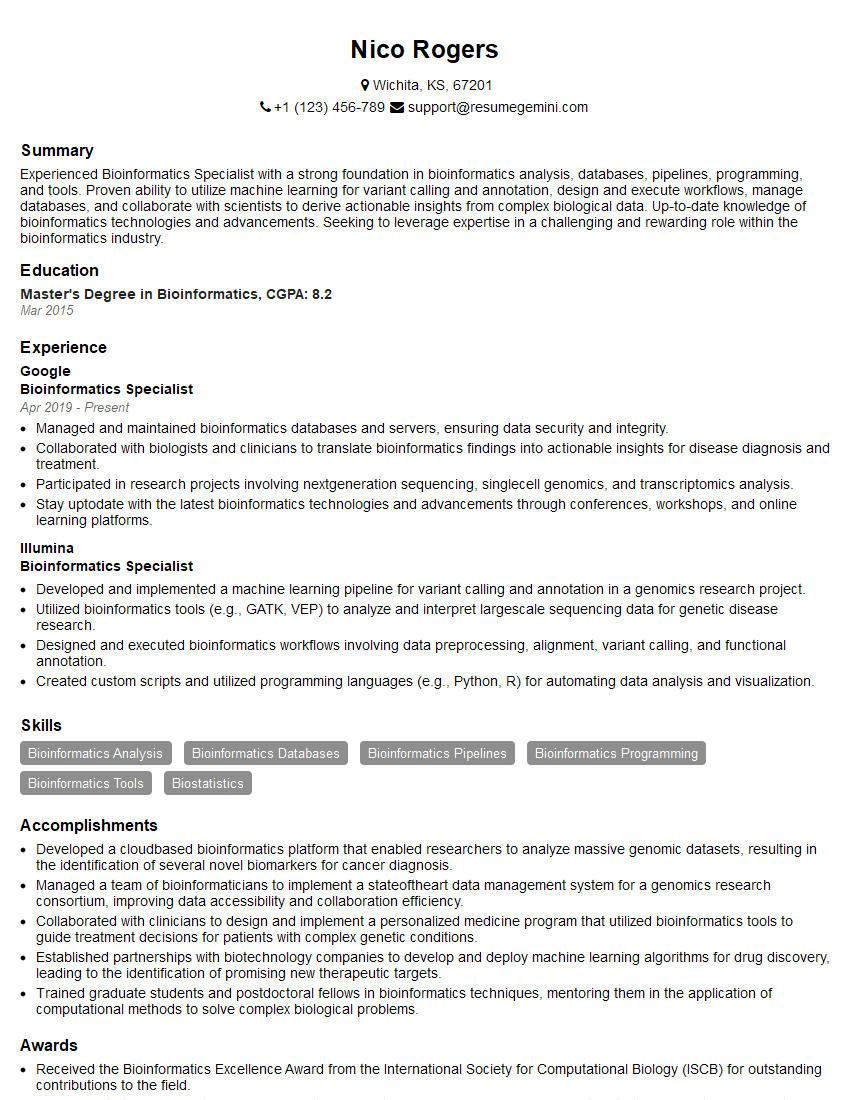Are you a seasoned Bioinformatics Specialist seeking a new career path? Discover our professionally built Bioinformatics Specialist Resume Template. This time-saving tool provides a solid foundation for your job search. Simply click “Edit Resume” to customize it with your unique experiences and achievements. Customize fonts and colors to match your personal style and increase your chances of landing your dream job. Explore more Resume Templates for additional options.

Nico Rogers
Bioinformatics Specialist
Summary
Experienced Bioinformatics Specialist with a strong foundation in bioinformatics analysis, databases, pipelines, programming, and tools. Proven ability to utilize machine learning for variant calling and annotation, design and execute workflows, manage databases, and collaborate with scientists to derive actionable insights from complex biological data. Up-to-date knowledge of bioinformatics technologies and advancements. Seeking to leverage expertise in a challenging and rewarding role within the bioinformatics industry.
Education
Master’s Degree in Bioinformatics
March 2015
Skills
- Bioinformatics Analysis
- Bioinformatics Databases
- Bioinformatics Pipelines
- Bioinformatics Programming
- Bioinformatics Tools
- Biostatistics
Work Experience
Bioinformatics Specialist
- Managed and maintained bioinformatics databases and servers, ensuring data security and integrity.
- Collaborated with biologists and clinicians to translate bioinformatics findings into actionable insights for disease diagnosis and treatment.
- Participated in research projects involving nextgeneration sequencing, singlecell genomics, and transcriptomics analysis.
- Stay uptodate with the latest bioinformatics technologies and advancements through conferences, workshops, and online learning platforms.
Bioinformatics Specialist
- Developed and implemented a machine learning pipeline for variant calling and annotation in a genomics research project.
- Utilized bioinformatics tools (e.g., GATK, VEP) to analyze and interpret largescale sequencing data for genetic disease research.
- Designed and executed bioinformatics workflows involving data preprocessing, alignment, variant calling, and functional annotation.
- Created custom scripts and utilized programming languages (e.g., Python, R) for automating data analysis and visualization.
Accomplishments
- Developed a cloudbased bioinformatics platform that enabled researchers to analyze massive genomic datasets, resulting in the identification of several novel biomarkers for cancer diagnosis.
- Managed a team of bioinformaticians to implement a stateoftheart data management system for a genomics research consortium, improving data accessibility and collaboration efficiency.
- Collaborated with clinicians to design and implement a personalized medicine program that utilized bioinformatics tools to guide treatment decisions for patients with complex genetic conditions.
- Established partnerships with biotechnology companies to develop and deploy machine learning algorithms for drug discovery, leading to the identification of promising new therapeutic targets.
- Trained graduate students and postdoctoral fellows in bioinformatics techniques, mentoring them in the application of computational methods to solve complex biological problems.
Awards
- Received the Bioinformatics Excellence Award from the International Society for Computational Biology (ISCB) for outstanding contributions to the field.
- Honored with the Presidents Award for Scientific Innovation for developing a novel algorithm that significantly improved the accuracy of genetic variant detection.
- Granted a National Institutes of Health (NIH) Research Excellence Award for advancing the understanding of complex genetic diseases through innovative bioinformatics approaches.
Certificates
- Certified Bioinformatics Professional (CBP)
- Certified Clinical Bioinformatics Scientist (CCBS)
- Genomics and Bioinformatics Certification (GBC)
- Next-Generation Sequencing Certification (NGSC)
Career Expert Tips:
- Select the ideal resume template to showcase your professional experience effectively.
- Master the art of resume writing to highlight your unique qualifications and achievements.
- Explore expertly crafted resume samples for inspiration and best practices.
- Build your best resume for free this new year with ResumeGemini. Enjoy exclusive discounts on ATS optimized resume templates.
How To Write Resume For Bioinformatics Specialist
- Quantify your accomplishments with specific metrics whenever possible.
- Highlight your expertise in bioinformatics tools and technologies.
- Showcase your ability to work independently and as part of a team.
- Demonstrate your passion for bioinformatics and your commitment to continuous learning.
Essential Experience Highlights for a Strong Bioinformatics Specialist Resume
- Developed and implemented machine learning pipelines for variant calling and annotation in genomics research projects.
- Utilized bioinformatics tools (e.g., GATK, VEP) to analyze and interpret large-scale sequencing data for genetic disease research.
- Designed and executed bioinformatics workflows involving data preprocessing, alignment, variant calling, and functional annotation.
- Created custom scripts and utilized programming languages (e.g., Python, R) for automating data analysis and visualization.
- Managed and maintained bioinformatics databases and servers, ensuring data security and integrity.
- Collaborated with biologists and clinicians to translate bioinformatics findings into actionable insights for disease diagnosis and treatment.
- Participated in research projects involving next-generation sequencing, single-cell genomics, and transcriptomics analysis.
Frequently Asked Questions (FAQ’s) For Bioinformatics Specialist
What are the primary responsibilities of a Bioinformatics Specialist?
Bioinformatics Specialists are responsible for developing and implementing bioinformatics pipelines, analyzing and interpreting biological data, managing databases, and collaborating with scientists to derive meaningful insights from complex datasets.
What skills are essential for a Bioinformatics Specialist?
Essential skills include proficiency in bioinformatics analysis, databases, pipelines, programming, and tools, as well as a strong foundation in biostatistics and genetics.
What is the job outlook for Bioinformatics Specialists?
The job outlook for Bioinformatics Specialists is expected to grow significantly in the coming years due to the increasing demand for data analysis in the healthcare and biotechnology industries.
What are the career advancement opportunities for Bioinformatics Specialists?
Bioinformatics Specialists can advance their careers by pursuing leadership roles in bioinformatics departments, specializing in specific areas such as genomics or proteomics, or transitioning to roles in data science or machine learning.
What are the typical salary expectations for Bioinformatics Specialists?
Salaries for Bioinformatics Specialists vary depending on experience, location, and industry, but typically range from $70,000 to $120,000 per year.
What are the educational requirements for a Bioinformatics Specialist?
Most Bioinformatics Specialists hold a Master’s Degree in Bioinformatics or a related field, such as computer science, biology, or statistics.